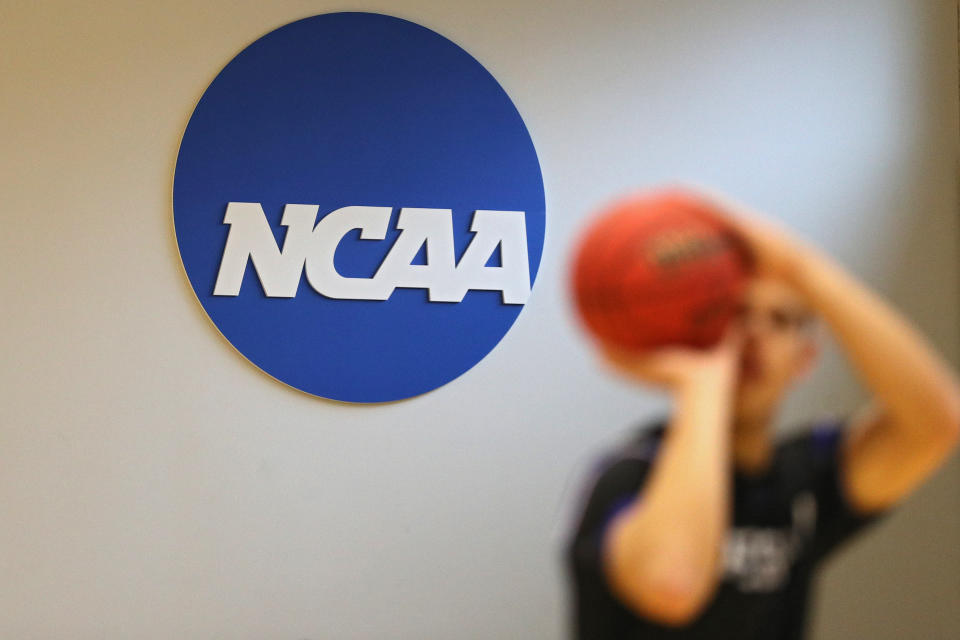Advocacy groups, athletes ask NCAA to ban events in Idaho due to transgender law
A large cohort of advocacy groups and accomplished athletes are asking that the state of Idaho be barred from hosting NCAA-sponsored events since it passed a law limiting female transgender and intersex athletes participation in sports.
Sports Illustrated obtained the letters sent to the NCAA. They’re signed by groups and include athletes, per SI’s Pat Forde, such as former tennis star Billie Jean King, USWNT champion Megan Rapinoe, three-time WNBA champion Sue Bird and Knicks player Reggie Bullock. The letter specifically mentions the 2021 NCAA men’s basketball tournament games scheduled for Boise.
Athletes ask NCAA to ban events in Idaho
The letter cites House Bill 500 (HB500), which was signed into law in March. Called the Fairness in Women’s Sports Act, it prohibits transgender athletes from competing in sports consistent with their gender identity. The law allows for girls and women to have their genitals checked if their biological sex is challenged. It is the first such law in the nation and other legislators have introduced similar bills in their own state assemblies.
“Given Idaho’s adoption of a discriminatory law that directly impacts college athletics, violates NCAA values, and undermines the dignity and well-being of NCAA athletes, Idaho schools no longer qualify to host NCAA events,” per the letter.
The signees to the letter voiced worry that the law would decrease participation in sports by all those in the LGBTQ community and that girls would be subjected to “invasive medical procedures” simply because someone says they might be transgender.
“This harms the NCAA’s goals of protecting athlete wellbeing and promoting diversity and inclusion in athletics.”
A full list of the professional athletes who signed the letter includes over 45 names. The letter was also signed by more than 400 student-athletes, via Athlete Ally.
NCAA will discuss at August meeting
Thursday afternoon, the NCAA said that it would discuss having events in Idaho at an August meeting.
“As we have previously stated, Idaho’s House Bill 500 and resulting law is harmful to transgender student-athletes and conflicts with the NCAA’s core values of inclusivity, respect and the equitable treatment of all individuals,” the NCAA said in a statement. “Further, Board of Governors policy requires host sites to demonstrate how they will provide an environment that is safe, healthy, and free of discrimination, plus safeguards the dignity of everyone involved in the event. As such, the NCAA Board of Governors was scheduled to discuss the legislation and its implications to student-athletes at its August meeting. NCAA championships are open to everyone, and the Association is committed to assuring that its events are safe and healthy for all who attend. It is our clear expectation that all NCAA student-athletes will be welcomed, treated with respect, and have nondiscriminatory participation wherever they compete.”
What Idaho events are at stake?

The group directly named the 2021 men’s basketball tournament, which is returning to Boise next spring. The first- and second-round games are scheduled for March 18-20 at Taco Bell Arena.
It would also disqualify any women’s basketball team in Idaho from hosting tournament games if they were to make their tournament. Any other postseason games in any sport would also be included. The Famous Idaho Potato Bowl also takes place in Boise.
NCAA precedent for banning states from hosting
The NCAA and the ACC banned North Carolina from hosting championship events when the state passed House Bill 2 in August 2016.
The law included a requirement for transgender people to use public bathrooms that matched the gender on their birth certificate. It also limited anti-discrimination protections.
NCAA tournament games and the ACC football championship were moved out of the state in the 2016-17 season.
The NCAA also banned South Carolina from holding predetermined championships in the state while it flew the Confederate flag on Statehouse grounds. It lifted the ban in 2015 after nearly 15 years in effect.
More from Yahoo Sports:


